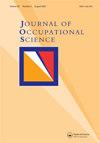The impact of the COVID-19 restrictions on nursing home residents: An occupational perspective
IF 2.4
Q1 SOCIAL SCIENCES, INTERDISCIPLINARY
引用次数: 5
Abstract
ABSTRACT Background: In Ireland, stringent restrictions were implemented to protect nursing home residents from contracting COVID-19. There is limited empirical research on how restrictions impacted residents’ occupational engagement or well-being. This study explored the impact of COVID-19 restrictions on the occupational engagement of nursing home residents and considered implications for occupational science. Methods: Using qualitative descriptive design, semi-structured telephone interviews were conducted with five residents in one nursing home. Two online focus groups were conducted with seven nursing home staff working across five sites. Data were analysed using interpretive thematic analysis. Results: Three overarching themes emerged regarding residents’ occupational engagement. ‘Loss of valued occupation’ related to residents’ reduced engagement in social and leisure occupations, with an erosion of the quality and meaning of their routine daily activities. ‘Counting the costs of restrictions on residents’ well-being’ revealed profound impacts on residents’ physical and mental health, including reduced mobility, weight loss, reduced independence, low mood and increased fear, anxiety, and frustration. ‘Finding resilience in the face of adversity’ indicated some hopeful adaptive and coping strategies among residents. Conclusions and implications: This study brings an occupational perspective to the impact of COVID-19 on nursing home residents by highlighting issues beyond infection control and virus transmission. Findings contribute to occupational science knowledge by highlighting issues of occupational deprivation, occupational disruption and reduced occupational choice, and ripple effects on well-being. Nursing home residents’ perspectives must be prioritised in future research and policy decision-making in responding and adapting to pandemics.COVID-19限制对养老院居民的影响:职业视角
摘要背景:爱尔兰实施了严格的限制措施,以保护养老院居民免受新冠肺炎感染。关于限制措施如何影响居民的职业参与或幸福感的实证研究有限。本研究探讨了新冠肺炎限制对养老院居民职业参与的影响,并考虑了对职业科学的影响。方法:采用定性描述性设计,对一家养老院的五位居民进行半结构化电话访谈。两个在线焦点小组由七名疗养院工作人员组成,他们在五个地点工作。数据采用解释性专题分析法进行分析。结果:出现了三个关于居民职业参与的总体主题失去有价值的职业“与居民对社交和休闲职业的参与减少有关,他们日常活动的质量和意义受到侵蚀。”计算限制居民幸福感的成本“揭示了对居民身心健康的深远影响,包括行动能力下降、体重减轻、独立性下降、情绪低落以及恐惧、焦虑和沮丧情绪增加。”“在逆境中找到韧性”表明了居民中一些充满希望的适应和应对策略。结论和影响:本研究通过强调感染控制和病毒传播之外的问题,为新冠肺炎对养老院居民的影响带来了职业视角。研究结果突出了职业剥夺、职业中断和职业选择减少以及对幸福感的连锁反应等问题,有助于提高职业科学知识。在应对和适应流行病的未来研究和政策决策中,必须优先考虑疗养院居民的观点。
本文章由计算机程序翻译,如有差异,请以英文原文为准。
求助全文
约1分钟内获得全文
求助全文
来源期刊

Journal of Occupational Science
SOCIAL SCIENCES, INTERDISCIPLINARY-
CiteScore
4.30
自引率
41.70%
发文量
46
 求助内容:
求助内容: 应助结果提醒方式:
应助结果提醒方式:


